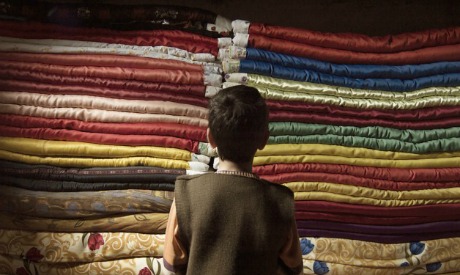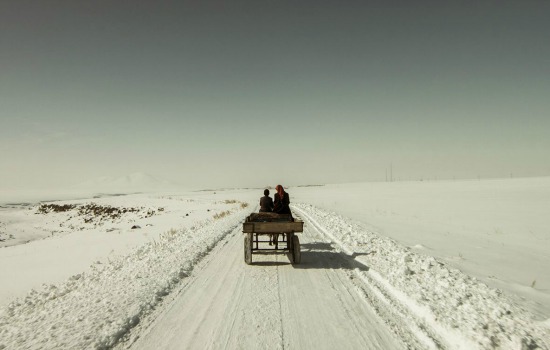
(Photo: still from film 'Rauf')
War does not discriminate; all must play by its arbitrary rules and pay for its consequences.
In ‘Rauf,’ the protagonist ― who bears the film’s name ― is a nine-year-old boy living in a remote Kurdish village in the region of Northeastern Anatolia in Turkey.
At the beginning of the film we witness Rauf becoming an apprentice to master carpenter Ahmet, father of the beautiful Zana. Zana is Rauf’s 20-year-old crush and perhaps the only young adult that we see in the film since the village's youth have either already left to the mountains to fight alongside Kurdish Partiya Karkeren Kurdistan (Kurdistan Workers' Party, or PKK) fighters, or joined the Turkish army in what we know as Turkey's ongoing conflict with the PKK.
As the film trails Rauf’s innocent infatuation with Zana, the main focus starts to shift towards the colour pink, which Rauf must find in the form of a floral scarf for Zana — an act deemed as a declaration of love and worthiness in Rauf’s gullible eyes.
Even though the colour pink is usually alluded to as a symbol of adolescence, innocence and fragility, as the story progresses pink starts to represent the rite of passage to manhood for Rauf. A passage filled with human gains and losses that ultimately affect and shape the remainder of Rauf’s childhood in an unforeseen fashion.
In the background, we hear the agonising sounds of battle, yet barely get to see it. Only scenes from afar with the nighttime skies lit by fired rockets and missiles. We learn about the youthful causalities of war, but never get in close contact with them. Perhaps, this was intended to show how Rauf is aware of the war, yet unable to comprehend what it constitutes for him as a child, or sensibly link it to those who dwell in the village.After all, this is a film created with a child’s perspective in mind.
The film does not side with either the PKK or the Turkish army, which have been locked in a thirty-plus-year bloodyconflict. Very few scenes portray the politics behind the conflict. All we see and experience is the aftermath of episodes in the ongoing conflict, where the village elders and children mourn together over the loss of youngsters, regardless of affiliation.
The weight of acting in this film is carried on the shoulders of child actors Alen Huseyin Gursoy (Rauf), Muhammed Ubic (Zeman) and Veli Ubic (Bedo).
The trio’s performance is spontaneous and lighthearted. This is explicitly reflected in a scene where Rauf talks about his infatuation with Zana to Zeman and Bedo, and wonders outloud, “How do we fall in love?” Bedo enlightens him by describing falling in love, as a collective feeling of “excitement”, “laughter” and the “inability to breathe.” Bedo concludes that “if you live without breathing, then you are in love.”
The film’s constantly shifting emotions and sentiments are elevated and deeply conveyed through the cinematography of Vedat Özdemir, who brings the tranquil magic of Anatolia to the screen, as the seasons change from freezing winter to the luminous spring, with majestic mountains serving as the backdrop for most of the film’s scenes.
‘Rauf’ is a collaborative effort between filmmakers Soner Caner and Baris Kaya. The film borrows heavily from and pays homage to the childhood of Caner ― also the film’s screenwriter ― who grew up experiencing the same armed conflict and lived in the same house and village where ‘Rauf’ was shot.
‘Rauf’ has been screened and won awards at several international film festivals, including the Istanbul Film Festival, Berlin Film Festival, Lessinia Film Festival and Chicago International Film Festival.

(Photo: still from 'Rauf')
Check here the complete programme of Panorama for Cairo, Alexandria, Ismailia and Port Said
Ahram Online is the media sponsor of the Panorama of the European Film and of Zawya
For more arts and culture news and updates, follow Ahram Online Arts and Culture on Twitter at @AhramOnlineArts and on Facebook at Ahram Online: Arts & Culture
Short link: